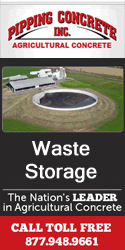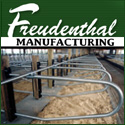 |
 |

|
|
|
Ohio Ag News Headlines |
 |
Shipboard Science in Lake Superior
Ohio Ag Connection - 06/24/2022
Educators are learning more about microplastics and other threats on Lake Superior.
Eleven Great Lakes educators are cruising Lake Superior from the Port of Duluth-Superior to the French River in Minnesota and the Amnicon River in Wisconsin this summer to gain hands-on freshwater science experience, curricula and resources that they can take home and use in their classrooms and other teaching environments.
The educators are part of the Great Lakes Sea Grant Superior Shipboard Science Workshop and are aboard Duluth's Vista Queen and the University of Minnesota Duluth, Large Lakes Observatory, Research Vessel (R/V) Blue Heron from June 27 through July 1.
"Our goals for the educators include helping them gain an understanding of Great Lakes water quality and microplastics, getting hands-on experience sampling and analyzing water, and helping to foster awareness and appreciation for research and natural resource management," says Marte Kitson, workshop leader and extension educator with Minnesota Sea Grant (MNSG).
This year's Shipboard Science Workshop includes two educators from Illinois, three from Minnesota, one from Ohio, and five from Wisconsin. All of them say they want to gain a deeper understanding of the types, abundance, and effects of microplastics on Lake Superior water quality and the lake's food web. MNSG Undergraduate Extension Education Intern Megan Gilles is accompany this year's workshop to gain professional experience.
Lorena Rose Mendoza, workshop lead researcher and professor of chemistry at the University of Wisconsin-Superior gave a preview of the event. "[Educators] will learn how to collect samples from the water, sediments, and sand on the beach. They will learn how to process the samples to separate possible microplastic particles using a microscope, and they will use the FTIR spectrometer to find out if the particles are really plastic particles or not," she said. Mendoza is researching the concentration of toxic compounds adsorbed on plastic particles, sediments, and tissues samples from the Oceans and the Great Lakes.
Microplastics are small pieces of plastic less than five millimeters long which can be harmful to ocean and Great Lakes aquatic life, according to the National Oceanic and Atmospheric Administration.
Throughout the five-day workshop, educators are participating in a mix of on-land and shipboard activities. Educators are collecting water quality data using an instrument called a CTD, which measures conductivity (C) (ability of a substance to pass an electric current), temperature (T), and depth (D). They are also working on macro-water issues.
The educators are using a Manta Trawl, which resembles a manta ray with metal wings and a broad mouth, to collect microplastics that may be in surface water. They are also using a special water sample bottle called a Niskin that allows samples to be taken at different water depths in a way that seals off the sample and allows it to be brought to the surface without mixing with water from different depths.
Microplastics are so small that it is difficult to identify what kind of plastic they are. To figure that out, the educators will use an instrument called Fourier-transform infrared spectrometer or FTIR spectrometer. This instrument uses infrared light (or radiation) to identify the molecular fingerprints of solids that adsorb (or gather) the infrared light, like microplastics, which can help identify the synthetic polymer of microplastics or what type of plastic the fragment or fiber particle may have come from.
Participants will get to play Minnesota Sea Grant's Watershed Game, an interactive, educational tool that helps individuals (especially local officials) understand the connection between land use and water quality.
The 2022 Sea Grant Shipboard Science Workshop will be the fifth year jointly coordinated by the Minnesota and Wisconsin Sea Grant programs. The Great Lakes Sea Grant programs, together with educators from throughout the Great Lakes basin, are part of the Sea Grant Center for Great Lakes Literacy. The center seeks to foster informed and responsible decisions that advance basin-wide stewardship by providing hands-on experiences, educational resources and networking opportunities that promote Great Lakes literacy among an engaged community of educators, scientists and citizens.
This workshop is an example Minnesota Sea Grant's unique programming. "The workshop is really only the beginning of a year-long program that provides myriad support to workshop participants," says Marte.
Funding for the 2022 Sea Grant Shipboard Science Workshop comes from the Environmental Protection Agency Great Lakes Restoration Initiative.
Minnesota Sea Grant is a federal-university partnership that brings water science to communities. We serve Minnesotans at work, at home, and at play. They are a system-wide program of the University of Minnesota with offices on the Duluth and St. Paul campuses.
|
 |


|
 |
|
Copyright © 2024 - Farms.com. All Rights Reserved. |
 |
|